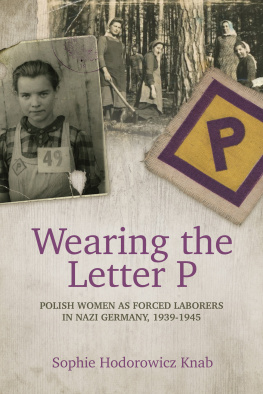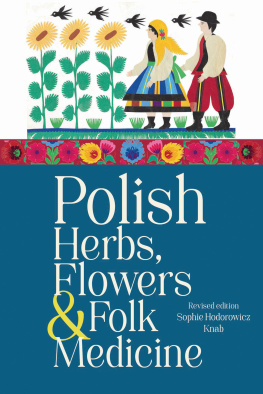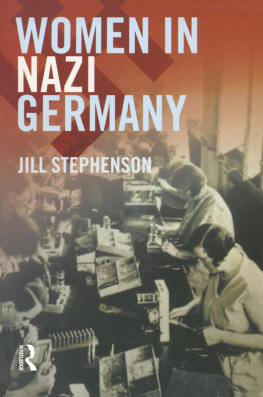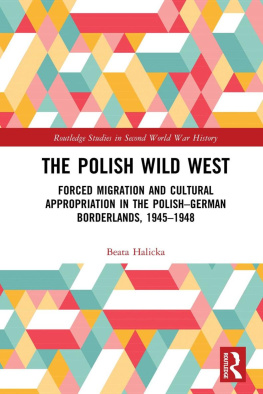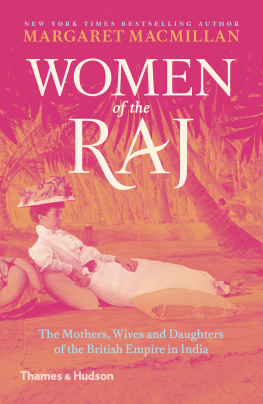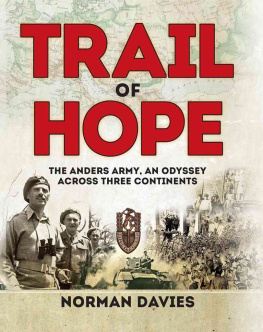
Wearing the Letter P

Wearing the Letter P
POLISH WOMEN AS FORCED LABORERS IN NAZI GERMANY 19391945
Sophie Hodorowicz Knab
Hippocrene Books
New York
Copyright 2016 Sophie Hodorowicz Knab
All rights reserved.
For further information, contact:
HIPPOCRENE BOOKS, INC.
171 Madison Avenue
New York, NY 10016
www.hippocrenebooks.com
Front cover photographs: Letter P patch from Bulmash Family Holocaust Collection, Greenslade Special Collection and Archives, Kenyon College; Karolina Sowinska, forced laborer and Polish women working in forestry in Wnschendorf, Germany, both from Archiwum Fundacji Polsko-Niemieckie Pojednanie, (FPNP) Warszawa.
Library of Congress Cataloging-in-Publication Data
Names: Knab, Sophie Hodorowicz, author.
Title: Wearing the letter P : Polish women as forced laborers in Nazi Germany, 1939-1945 / Sophie Hodorowicz Knab.
Description: New York : Hippocrene Books, [2016] | Includes bibliographical references.
Identifiers: LCCN 2016034889| ISBN 9780781813594 (paperback) | .ISBN 078181359X (paperback)
Subjects: LCSH: World War, 1939-1945--Conscript labor--Germany. | World War, 1939-1945--Women--Germany. | Polish people--Germany--History--20th century. | Women--Germany--History--20th century. | Forced labor--Germany--History--20th century. | Foreign workers, Polish--Germany--History--20th century. | World War, 1939-1945--Personal narratives, Polish. | World War, 1939-1945--Atrocities--Germany. | Poland--History--Occupation, 1939-1945. | Germany--Social conditions--1933-1945.
Classification: LCC D805.G3 K593 2016 | DDC 940.54/05--dc23 ..LC record available at https://lccn.loc.gov/2016034889
Printed in the United States of America.
Dedicated to my mother, Jzefa Zalewska Hodorowicz, Forced Laborer, Rheinmetall Borsig, Unterluss, Germany, 19431945 and to all the women of Poland who suffered and died as forced laborers during World War II.
May their experiences survive and be remembered.

Cze ich pamici
Contents
Acknowledgments
There are so many people I would like to thank, but I must make special mention of the following:
My mother and father, whom I thank for my origins, my deep feelings for my culture and the stories of their lives in Poland and their experiences during World War II.
My brothers, Michael, Andrew, and Matthew. We were born in the camps during and after the war. This book is our family story, our history that we have kept alive these many years through our recollections and stories. And my niece, Cate Hodorowicz Hennessey, who has taken up the baton in the relay for family history and for the discussions on research and the writing life.
My publisher, Hippocrene Books, and Barbara Keane-Pigeon and Colette Laroya and all the people behind the scenes who helped with the creation of this book but especially my editor, Priti Chitnis Gress, for her belief that womens voices should be heard.
I would like to recognize the personnel of many libraries and archives who were of tremendous assistance to me throughout the research process. I am indebted to the stellar library personnel at Niagara County Community College including librarians Nancy Kennedy, Lillian Passanese, and Mary Beth Morse. Truly, your help was always above and beyond. Special mention and gratitude has to go to Jeanne Tuohey who was there from the very start of this project and never failed to respond to my queries through these many years; to NCCC library staff Barbara Melcher and Maureen Winters for your many kindnesses and assistance; to Amy Schmidt and the many anonymous individuals who provided direct and online assistance at the National Archives in College Park, Maryland; and to Regina Frackowiak, reference librarian at the Library of Congress, and the staff at the United States Holocaust Memorial Museum, the New York Public Library, and Museum Victoria in Melbourne, Australia.
In Poland, I would like to thank the following individuals and archives: Monica Bednarek, Muzeum Historyczne Miasta Krakowa, Odzial Pomorska; Jakub Deka, program coordinator at Fundacji Polsko Niemieckie Pojednanie in Warsaw, and the Archiwum Pastwowe in Warsaw; Maria Rzeniak of Muzeum Zamojskie in Zamo; Anna Jagodziska at the Instytut Pamici Narodowej in Warsaw; Dr. Andrzej Chmielarz, Wojskowego Centrum Edukacji Obywatelskiej; the entire Staczyk family with special recognition to my cousin Jadwiga Staczyk and her daughter Joanna Stacyzk-Tcza for their constant help and welcome each time I visited Poland; and to all my Zalewski cousins who shared food, photographs, and stories.
In Germany, my thanks to Rainer Voss, historian in Celle, for meeting with me in Unterluss and sharing his knowledge of the events that took place there during the war; to Ulricke Holdt and Iwona Waloszcyk who were so welcoming and helpful at the DZOK Archives in Ulm; to the Archive Forced Labor 1939-1945: History and Memory of Freie Universitat Berlin who have carefully recorded the memories, not just of Polish forced laborers and concentration camp survivors, but of individuals throughout Europe.
My thanks to Andrew Golebiowski, Regina Hanchak, Anne Fundalinski Kaczynski, Theresa Fundalinski, Ann Zwolak Rouleau, Eva Zwolak Gelly, and Antoni Markut, the founding members of The Polish Legacy Project-WW II Buffalo. Children of Polish survivors of World War II, we joined together to honor, document, and disseminate the stories of Polish World War II survivors who settled in Western New York. You inspired me to work harder to finish this book.
My thanks to Peter D. Hays, who worked with me over these many years translating material from German, treating each of my requests with promptness, care, and thoughtfulness; and to Karol Olkowski and Michael Hutten who rendered technical assistance.
To my husband Edwardyou cherished and respected my parents and what they had gone through; there was never an archive too far away or an expense too costly to write this book; there was never a time when I didnt have your complete unconditional support. For all of that, truly, there are no words.
Introduction
IN THE TRIAL OF WAR CRIMINALS before the International Military Tribunal at Nuremberg, the Nazi defendants were charged with formulating and executing a Common Plan or Conspiracy to commit War Crimes. This plan involved, among other things, the practice of total war including methods of combat and of military occupation in direct conflict with the laws and customs of war.
The Nazis and the National Socialist Party adhered to the notion that the German people were a race of superior humans that had the right to enslave or eliminate inferior beings. In their elaborate racial classification system, the Poles were considered Untermensch (subhuman). During the six long years of German occupation, the citizens of Poland were subject to inhumane acts and unspeakable atrocities. The Germans herded the Jews into ghettos where they slowly starved to death. They were exploited for slave labor in concentration camps where they died from abuse, hunger, physical illness, and overwork. The Nazis systematically murdered millions of Jews from Poland and other countries in the infamous gas chambers of Auschwitz, Belzec, Majdanek, and Treblinka that they had built on Polish soil. The Siti and Roma Gypsies fared no better. Considered racially and socially inferior elements, they were interned in ghettos and then sent to extermination camps.
Next page
